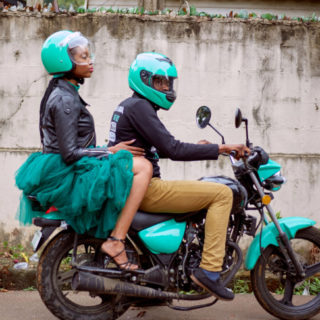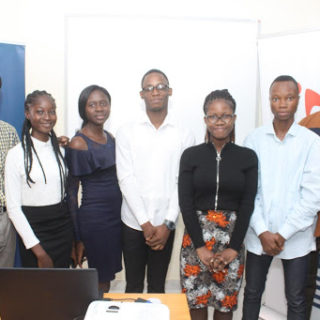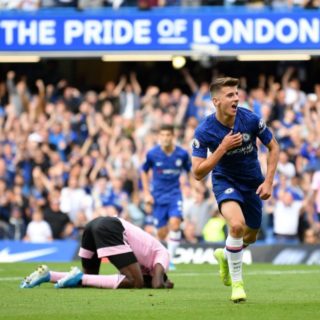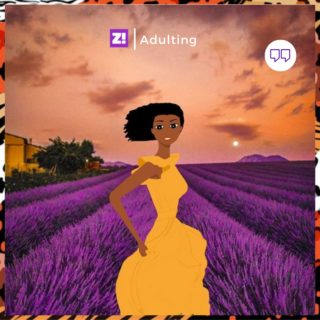Burna Boy’s follow-up to his 2018 career-defining album “Outside” has arrived, four months after “Steel and Copper“, an intermediate release that placed his year in context. Just so you’re certain how significant his 7th body of work is, the album’s press release alludes to the belief that 7 is the number of perfection, “an auspicious sign from our gods that one is on the right life path.”
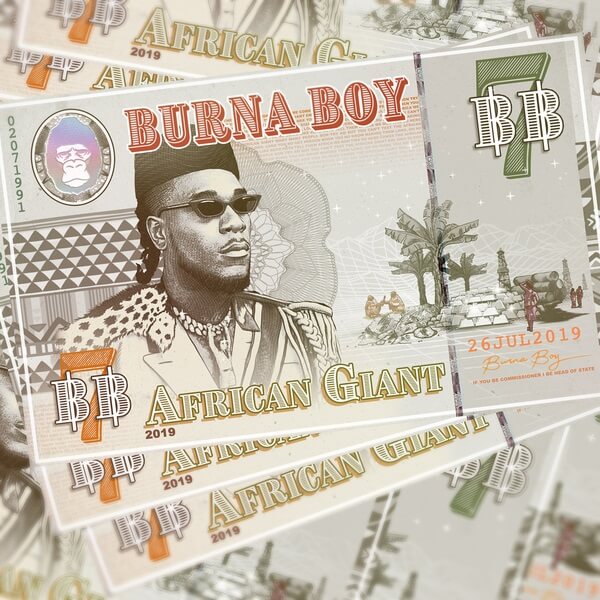
Burna would be justified in thinking so. In the last 18 months, the 28-year old who opened his debut album, “L.I.F.E” by implying that his path was predesigned has put together the run to support those claims. When, days before his album’s release, Burna performed on Jimmy Kimmel’s show — a high profile set that many compared to Majek Fashek’s 1992 appearance on the David Letterman show — it seemed like a logical next step, not the rare exotic showcase that African music is often presented as.
For the first time in a decade, fans are acknowledging that Afropop’s long-standing duopoly, Wizkid and Davido has a third entrant. The truth is that the duopoly no longer exists.
His response to the Coachella 2019 promotional fliers may have shot the ‘African Giant’ tag into infamy, but the multiple themes that dominate the album date further back to his earliest mixtape, “Burn Notice”.
Burna Boy’s Coachella set also set off an inevitable conversation on how much African music needs the US market. If he felt any pressure to address those concerns, there is no evidence here.
“African Giant” sounds like an assertion of Burna’s belief in himself, the era that birthed his multiple tastes of the Nigerian experience, the cultures he has come to cross-pollinate and the continent he speaks for.
Much of that is down to Burna’s own primary inspirations. Damini Ogulu has, in the last few months, given a contemporary twist to Fela’s militant afrobeat on three singles, “Ja Ara E“, “Anybody” and “Gbona“. The album’s title track follows the trend, but more so in theme than tone. “Tell them Africa don tire,” is an apt summation of the collective mood among the continent’s youth.
Like Fela, Burna presents himself as a messiah – “so here comes the African Giant,” – even if he knows it will take more to save us. It closes with a sample of an Igbo folk song with lyrics, “Obudu Obelugo
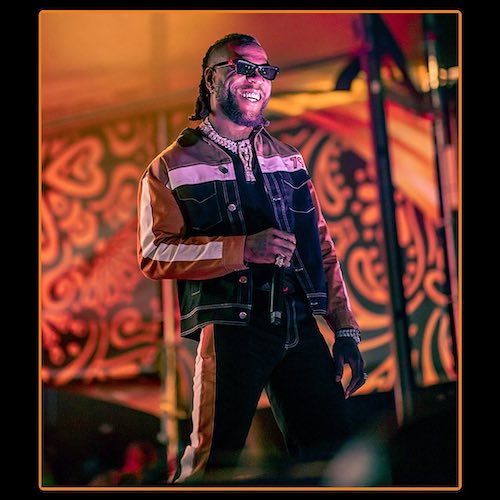
“Wetin Man Go Do“, one of the album’s more sombre cuts, shrouds the perpetuity of the average Nigerian’s struggles for necessities in folksy guitars and Fela Kuti’s call-and-response delivery. “Dangote“, titled after Nigeria’s richest man, is a reminder that the paper chase never ends — something a large number of his listeners relate to in more survivalist terms. “Collateral Damage” sits on a jaunty beat that Burna uses to evoke a charged Fela Kuti and blatantly state several Nigerian truths. “My country problem pass Jesus” is a sharp comment in a society where religion has never delivered returns on the people’s devotion.
“Another Story”, one of the album’s best tracks, samples the opening words of Jide Olanrewaju’s acclaimed documentary “A History of Nigeria“. (The excerpt, which describes how the Royal Niger Company traded the area now known as Nigeria, has inspired a wave of interest so strong that many fans are now revisiting “Royal Niger Company” by rapper Jesse Jagz.) Buoyed by a stellar, descriptive verse by Ghanaian rapper, M.anifest, Burna interpolates other conscious songs: 2baba’s “E Be Like Say” and Original Stereoman’s street-pop hit, “E Dey Pain Me” to paint what is, in essence, an updated version of the same reality.
Burna Boy’s 2018 album was described as a ‘fine lesson in mixing genres without making mud’, “African Giant” sums up what it means to be a Nigerian born in the 1990s, raised on different continents in the digital 2000s, and representing Africa in a globalised 2019.
These multiple perspectives (on life, culture and music) come across in the variety of sounds he manages to compress into one cohesive body of work. He’s schooled in the electronically-produced bashment and garage sounds of the UK, but Burna’s as comfortable on the live instruments of Ghanaian highlife and Afrobeat.
It’s hard to remember the man who was first introduced to fanatics as a reggae hyphenate. On “African Giant”, Burna seems intent on further obscuring the lines between Afropop and the form of global pop music that has incorporated African melodies. If in doubt, listen to anything from Ed Sheeran’s “No. 6 Collaborations” EP to Beyonce’s “Lion King: The Gift”.
Compared to the high-octane, genre-bending scale of “Outside”, “African Giant” may, at first listen, sound like a deliberately simple take on Afro-fusion. The latter is more atmospheric than its
He is as confident painting vivid love scenes in pidgin alongside UK R&B sweetheart, Jorja Smith on “Gum Body
On “Omo“, Burna goes back in time to give us a taste of the melodies that made “Smooth Sailing” a cult
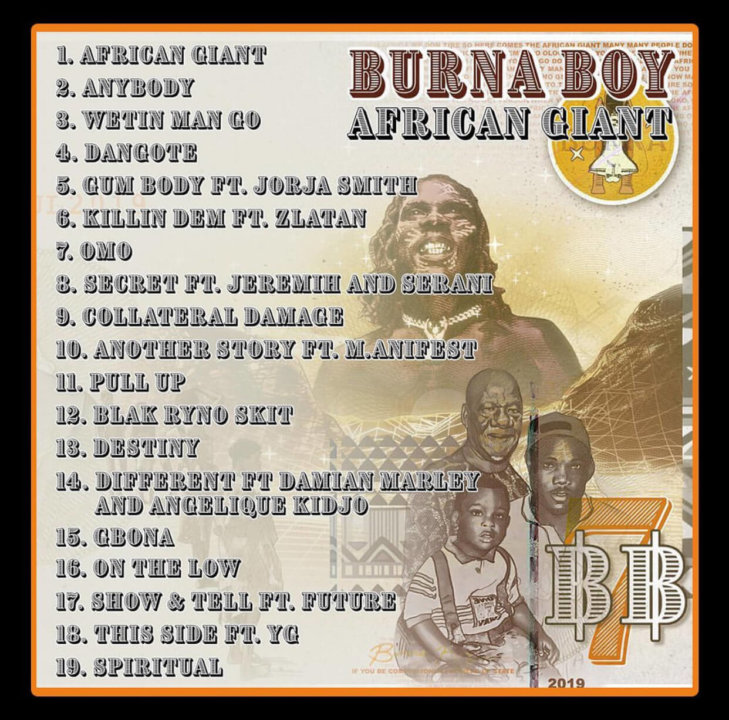
“This Side“, his collaboration with YG is an unusual gem that sits smack between Lagos and the West Coast that the US rapper wears on his sleeve.
Much of the album’s cohesion is courtesy of the featured artists – a motley crew ranging from a breakout Nigerian rapper to semi-retired world music icons. There are the men and women behind the scenes as well – Burna personally hailed the work of UMPG A&R,
Thematic albums work best when the soundscape is crafted by one or a few producers. Burna himself has done this before; 2013’s “L.I.F.E” was helmed by producer Leriq to great effect. Here, the list is
Not all the collaborations stick. A Future & Burna Boy collab should be flames on paper, but when restricted to an afro-Carribean beat, the two don’t strike up synergy on “Show And Tell“.
More than anything, “African Giant” is a triumph of
Perhaps there is something to be said here about fans and our entitlement to artists and their growth. Not many expected that the hyper-masculine singer who made an album wondering aloud about his place in the world could find himself enough to define a path for the next wave of Nigerian musicians.
In the years since he had his concert cancelled over a court case, Burna Boy has opened up layers within his art that provide context for his person. On “African Giant”, he is at many times sensual (“Pull Up”,”Gum Body”), celebratory (“Omo”, “Anybody”), ponderous (“African Giant”, “Wetin Man Go Do”), introspective (“Destiny”) and militant (“Spiritual”, “Different”).

The album hit its climax at two points. “Pull Up”, the album’s sixth single is followed by a supernal skit by Blaq Ryno that sounds more like panegyrics than a sketch. What follows is “Destiny”, an autobiographical song that could well be an update of “Where I Come From”.
“Feel good, I ain’t gonna lie… They can take everything I have, but they can’t touch my destiny“, he sings. He’s come a long way from the days spent “standing on the corridors, dodging feds and the coroners.”
For all of his troubles, it’s the first time Burna admitted he’s impressed at how his story’s unfolding. It’s a sharp shift from the fears of failure he expressed in the past, and provides fitting context for “Different“, the album’s most glorious moment.
Introduced with a brooding beat, Burna taps two heavyweights, Damian Marley and Angelique Kidjo for a song that is bound to make award nominations lists. “Different” is just that… different. In many ways, it also suggests Burna’s ascension into a class of greats. The PH-born singer reaches astonishing new heights trading monologues with Damian Marley on inequality and the confrontational prophets that these times require.
Four years ago, invoking Burna Boy in the same sentence as Damian Marley & Angelique Kidjo, or worse, as a socially-conscious freedom fighter would have been seen as hasty or disingenuous. Since he propelled himself to the forefront of conversations about Afropop’s global push, however, his belligerence has been translated into the form of hostile indifference it takes to absolve African music of the biases it encounters.
The other crescendo comes at the end of the album. On “Spiritual”, Burna Boy takes on a simple Nigerian pop beat to address that transition. “When you start,
As the closing voice on the album, Bose Ogulu’s monologue portrays “African Giant” as a potential watershed moment in Africa’s music and culture.
The black world erupted in pride when Burna Boy’s mother/manager, first said “…the message from Burna I believe would be that every black person should please remember that you were African before anything else” as she received his 2019 BET Best International Act nod on his
The “Afrobeats to the world” narrative is built on the belief that the world must accept African culture, first for commercial success, but mostly as some sort of validation. “African Giant” comes at a time when it’s never been better to be African. Numerous black artists are accepting their African
Although he is often depicted as Nigeria’s best chance of ‘crossing over’, particularly in the US, Burna Boy has defined a different path for himself on “African Giant”. It is a statement-of-intent; that global appeal can be achieved without sacrificing the influences and experiences that make Africans and our culture distinct.
In a world where movements of the oppressed clamour for validation to varying levels of success, Burna’s symbolic 7th body of work speaks to a continent’s place in the world – it is a thesis on why African pride should be our starting point.

